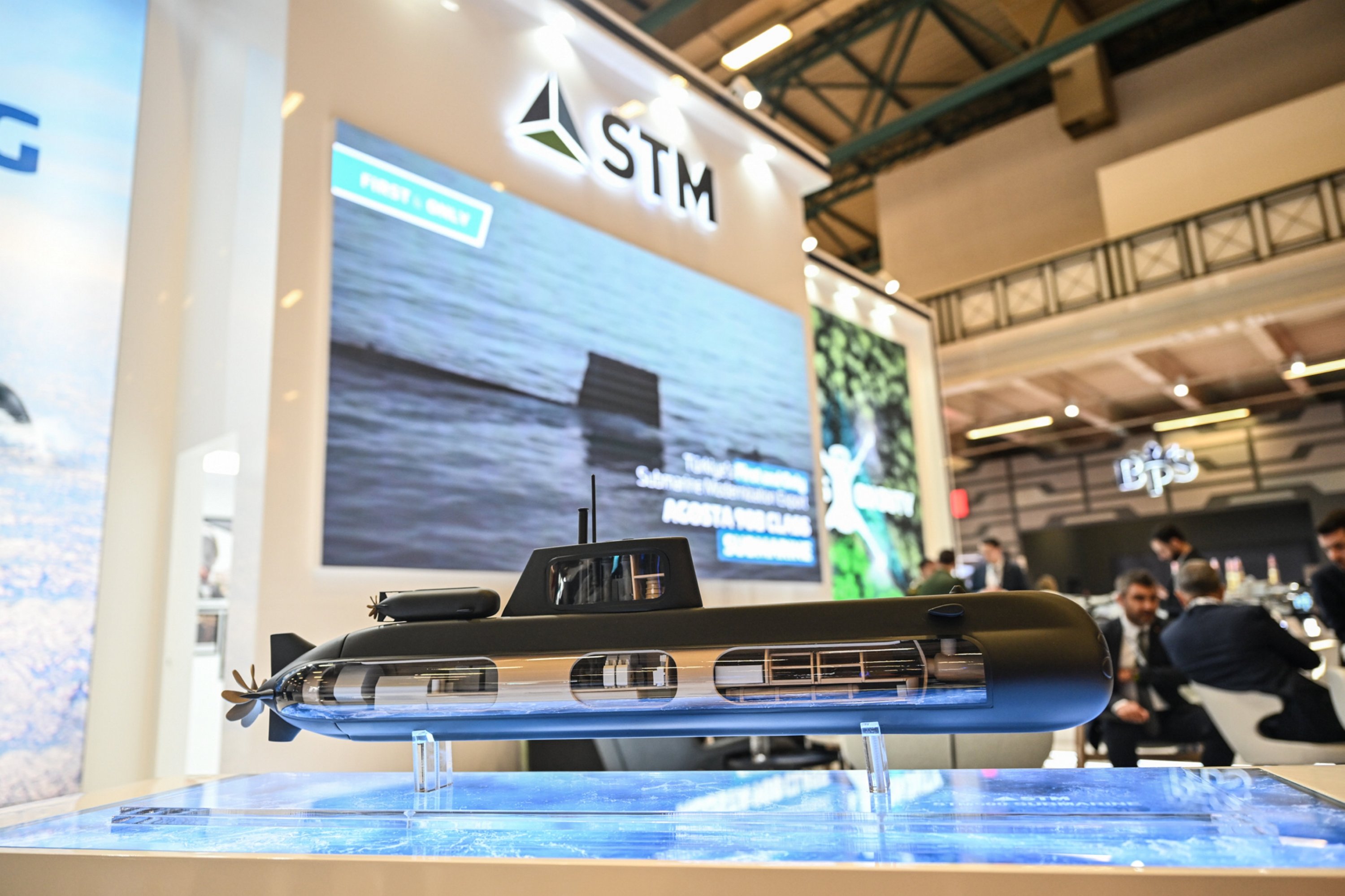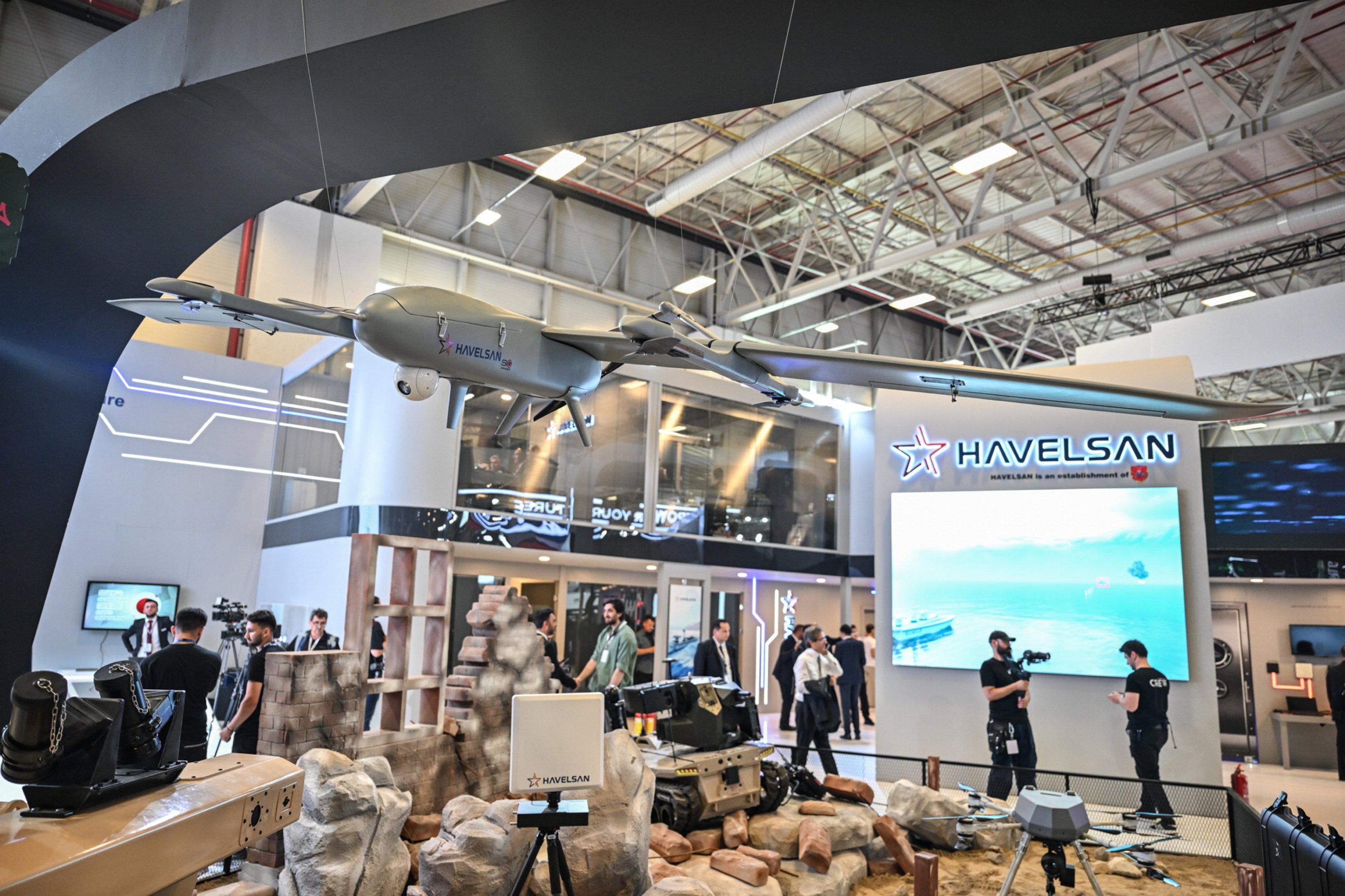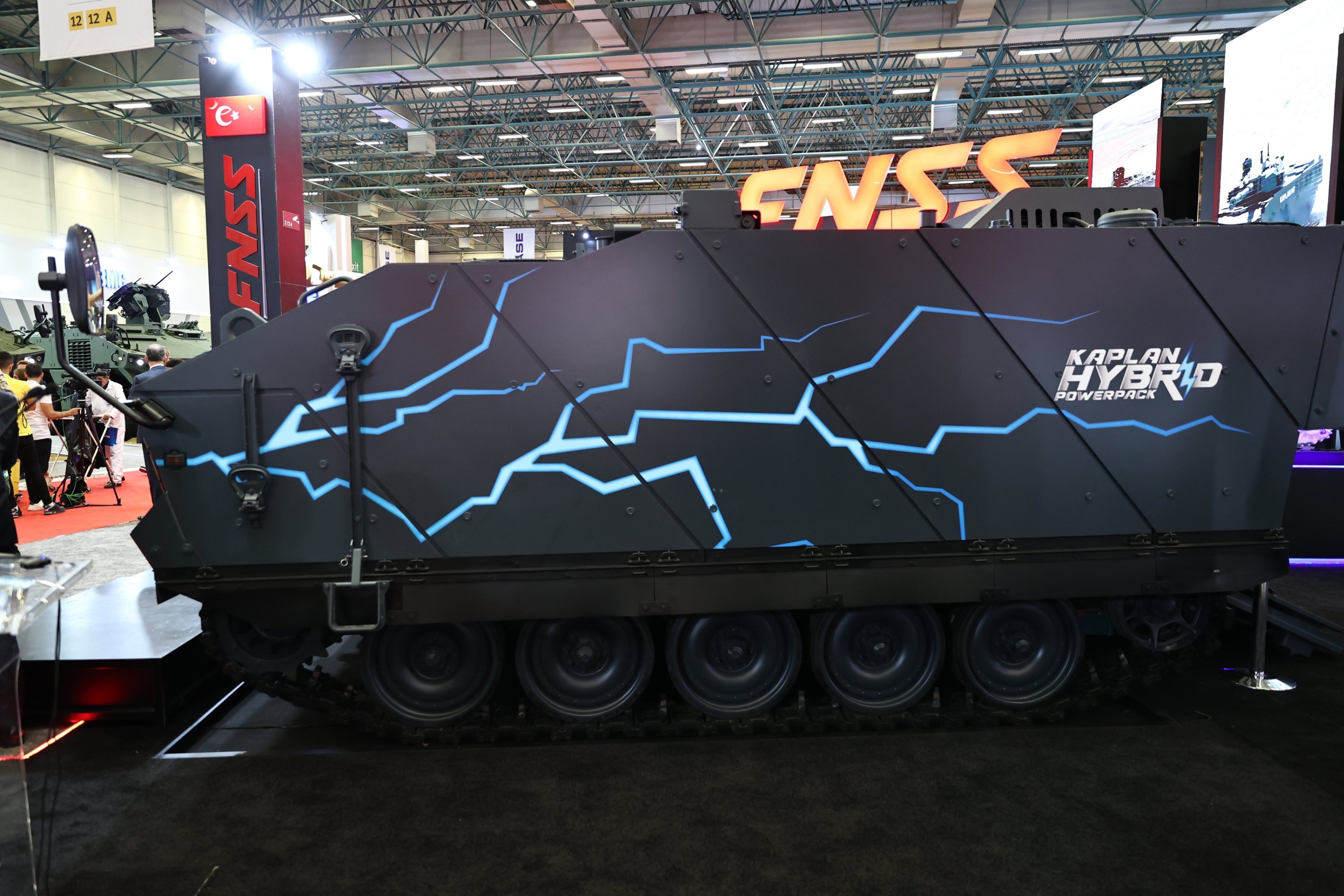© Turkuvaz Haberleşme ve Yayıncılık 2026
From new drones, marine platforms and air defense systems to next-generation weapons and armored vehicles, Turkish defense manufacturers are displaying their latest indigenous technologies and products, as they seek to expand their global reach and add pace to the localization drive.
The 16th edition of the four-day International Defense Industry Fair (IDEF) is hosting around 1,500 companies from Türkiye and the rest of the world, in addition to about 200 delegations. The expo that kicked off on Tuesday and runs through Friday is expected to see multiple export and cooperation agreements signed with Turkish defense companies as well as between countries.
One of the industry pioneers, STM Defense Technologies and Trade is showcasing a new portfolio of products led by marine projects and tactical mini drones, in addition to radar systems.
STM is engaged in the development of Türkiye’s first small-sized national submarine project, STM500, and seeks to launch block combinations soon. The project will place Türkiye among a few countries in the world that can design and produce their own submarine, according to its General Manager Özgür Güleryüz.
In what will mark a new milestone for the industry, the company plans to deliver Türkiye’s first indigenous frigate TCG Istanbul (F-515), within 2023, according to Güleryüz. The vessel that is currently undergoing sea tests will mark the most advanced frigate in Türkiye’s naval inventory and will perform advanced air defense, surface warfare, submarine defense warfare and patrol activities.
Developed as part of the landmark National Ship (MILGEM) project to build multipurpose corvettes and frigates, the TCG Istanbul will be integrated with a domestic electronic assault system and will feature locally made guided missiles and anti-torpedo shields.
Türkiye's defense industry has undergone a profound transformation over the last two decades, in a breakthrough that has been spurred by a score of Western embargoes. It aimed at reducing external dependency on Western arms through innovative engineering initiatives and domestically developed technologies and ensuring self-sufficiency.
The drive has prompted the development of homegrown air, land and marine platforms, which eventually helped Türkiye seal billions of dollars worth of deals in recent years. The localization drive helped lower Türkiye's foreign dependency in the defense industry from around 80% in the early 2000s to some 20% today.
The capabilities of its vehicles, spearheaded by combat drones, triggered unprecedented demand that saw Türkiye's defense industry exports hit a record of more than $4.4 billion in 2022.
President Recep Tayyip Erdoğan on Tuesday said shipments in the first half of 2023 hit a record of nearly $2.4 billion and said they aimed to reach at least $6 billion by the end of the year.

STM is, meanwhile, also planning to launch its unmanned underwater autonomous vehicle, seeking to perform its maiden ride next year, according to Güleryüz.
In what marked one of the biggest export successes of the Turkish defense sector in the field of software to date, STM was awarded a major contract to develop a critical software system that will be used in intelligence flows at all NATO facilities around the world.
Replacing Western technology with indigenously developed weaponry harks back to the origins of Türkiye's domestic arms industry, which Ankara has pushed ever since the U.S.' 1970s arms embargo over its military intervention in the island of Cyprus that was prompted by a Greek Cypriot coup aimed at Greece’s annexation of the island. Türkiye acted as a guarantor power to protect Turkish Cypriots from persecution and violence.
Elsewhere at IDEF, Turkish Aerospace Industries (TAI) General Manager Temel Kotil said the manufacturer of Türkiye’s first homegrown 5th-generation fighter jet plans to launch the warplane equipped with an indigenous engine in 2028.
Named KAAN, the jet made a runway debut and completed its first taxi test after starting its engines for the first time in mid-March. The aircraft has been developed to replace the F-16s in the Air Forces Command’s fleet and are planned to be phased out starting in the 2030s.
There is also an unprecedented interest in Türkiye’s first domestically developed heavy-class attack helicopter, particularly from the Gulf countries, said Kotil. Featuring 2,500 horsepower engines and a maximum takeoff weight of 11.5 tons, the Atak-2 successfully started its engine for the first time this April.
“The fact that it can carry 1.3 tons of explosives, lift weights on it, and is equipped with a 30-millimeter gun has generated international interest far above expectations,” the official said.
Kotil also stressed major interest in the company’s pioneering combat drone Aksungur and turboprop trainer aircraft Hürküş, which can also be used for ground attack missions.
"Aksungur UAV is doing very well, we have had many customers abroad. New customers are also coming. We are seeing a serious demand boom for Aksungur,” Kotil told reporters. "There is a great interest in Hürküş. We have a very high chance of becoming a market leader."
TAI seeks to generate a $2 billion turnover this year and has set the bar at $10 billion for 2028, the official noted.

Among others, Havelsan, a prominent defense software and hardware maker and developer of multiple air and land vehicles, has sealed a deal to export its unmanned aerial vehicle named BAHA to Africa, its Product Development and Production Director Veysel Ataoğlu said.
“We have made our first export today. We can say that we have exported BAHA to an African country, and we will be sending our vehicles there soon,” Ataoğlu told reporters on Wednesday.
Elsewhere at the expo, another defense giant Aselsan is showcasing four different air defense systems.
The GÜRZ Hybrid Air Defense System, GÖKSUR Close Air Defense Missile System, GÖKDEMİR Missile Launch System, and GÖKBERK Mobile Laser Weapon System promise to enhance Türkiye’s air defense capabilities.
Haluk Görgün, head of the Presidency of Defense Industries (SSB), emphasized the global significance of air defense systems, saying that in recent years, Türkiye has achieved remarkable progress through a collaboration with companies such as Aselsan, Roketsan, the Defense Industries Research and Development Institute (SAGE) of the Scientific and Technological Research Council of Türkiye (TÜBITAK) and numerous subcontractors, which he said "has resulted in the development of highly valuable products.”
“At the core of our layered air defense system lies the 'soft kill' and 'hard kill' capabilities, designed to operate at the bottom layer,” Görgün explained.
“We take pride in our ability to design and produce not only the whole systems but also the essential sub-systems, sensors, electro-optic devices, radar, and laser units required for these advanced defense systems. Each project we undertake aims to cater to the specific needs of layered air defense systems for different platforms,” Görgün stressed.
Aselsan General Manager Ahmet Akyol, meanwhile, emphasized their demonstration of knowledge and expertise in the field of air and missile defense through the development of new domestic systems.
“The importance of air superiority in recent conflicts both regionally and globally underscores the significance of safeguarding airspace with effective air defense systems. These systems have proven to be highly deterrent,” he said.
Meanwhile, defense firm Meteksan showcased FELIX, a system that provides protection against unmanned aerial vehicles. The system can scan the sky up to a 24-kilometer (some 15-mile) radius and detect UAVs with its Retinat AESA radar system.
Gürbağ, a private Türkiye-based firm, introduced its hydrogen-powered launching system for kamikaze drones. The system, named Hyrdo-GIDS, can launch drones of up to 200 kilograms in weight. Tests for 800-1,200 kilograms are ongoing.
Prominent weapons maker Canik has also exhibited strong products at the event. The company rolled out the Canik M3, the advanced new version of its 12.7-mm anti-aircraft firearm Canik M2 QCB.
Canik, which last year bought British AEI Systems, one of the world's leading companies in medium-caliber gun production, also showcased the 30-mm Venom LR for the first time.
Another defense firm, Nurol, introduced a new armored vehicle called the NMS Light.
Sarsılmaz, another gun maker, displayed new products at the event, including autonomous and unmanned weapons systems.
The land vehicle manufacturer FNSS introduced its 20-ton class tracked armored vehicle KAPLAN with a hybrid power pack, which is said to be paving the way for the potential development of a hybrid tank.
KAPLAN Hybrid provides significant gains in takeoff speed, range and cost-effective fuel compared to diesel vehicles, according to the company.
FNSS General Manager Nail Kurt said that the 20-ton class study constitutes the first stage of the 2-stage solution in this area, and then they aim for a solution that can be applied to 30-40 tons and light tanks.

Kurt stated that when the 40-ton qualification is completed after three to four years, it will be possible to reach a hybrid power group that can be used for the main battle tank with the developments in battery technologies.
